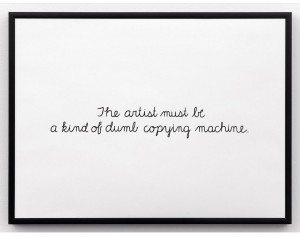Benjamin Buchloh’s Writings Say Much Against Contemporary Appropriation Practices
One of the main battles regarding current appropriation practices concerns the question of artistic intent. I certainly believe–and have been a strong proponent of–artistic intent, especially when it comes to the taking of someone else’s property (the aspect of criticality logically follows intent).
In his new book of collected essays, Formalism and Historicity, art historian and critic Benjamin Buchloh unleashes a critical blitzkrieg on a range of artists, many of which are responsible for the current wave of indolent appropriation practices. In his book review, PacPobric, assistant editor for exhibitions and reviews at The Art Newspaper, notes that Buchloh assaults Jeff Koons, Damien Hirst, Takashi Mukarami and Richard Prince because they “enact an homage to precisely those… corporations that sustain their regimes by enforcing the dictates of a collectively operative pathology.”
Pathological is bad enough. But add tautological art to the mix and we have a very real problem. Some argue that the mere repetition and copying of a preexisting copyrightable work is in and of itself critical. The question isn’t simply, why, it’s more of the, how so? This question is rarely answered, and when it is the answer given is devoid of any grain of thought or intellectual rigor. The answer by the appropriation-per-se-is-fair-use mafia is simply, because it’s art. Tautology at its best? What the mafia really means to say–in not so many words–is more elegantly put by Pobric as “allegory reduced to democratic accumulation: everything is interesting! Everything has something to say!” (Think here the lazy appropriation of Instagram images doused with a few words here and there.)
That is bad enough, but unfortunately in our populist academic art world, there’s a solid belief that everyone has something (important) to say. Pobric adds, “This anything-goes pluralism puts strain on Buchloh’s particular brand of pessimism, because outwardly, pluralism sustains a healthy populism: isn’t it a good thing that anything can be art? Doesn’t it mean that we are now all artists or—at the very least—curators?” And, doesn’t it mean that we’re all now art critics?
The state of appropriation art and its relevance to copyright has, unfortunately, also fallen prey to lazy analysis, which, I suppose, is what makes it populist. When everyone can do it, it’s not worth doing. Why the hell spend any time assessing whether the copying of Instagram images, chrome eggs or postcards of puppies is fair use? Because it’s art, you say, and all making is worthy of defending “as art” and–gasp!–free speech, regardless of its critical acumen. Fine, you can have it. Go on ahead and keep replicating objects and images with that mindless grin of yours. You can keep it or sell it. Just don’t call it art.
In the end, as Pobric rightly notes, “this optimism is evidence of a sad nihilism: when everything is worth discussing, there is no nothing left to say.” And when reduced to its lowest common denominator, art ceases to be art and becomes another brick in the wall–junk food for the masses. Art, Pobric argues, cannot be democratic, “Whatever it does for politics, democracy has so far always been a threat to art.” When it comes to some appropriation “artists,” the threat to art could not be more true.
Tags: appropriation, art, benjamin buchloh, Copyright, criticality, fair use, hirst, Jeff Koons, law, Murakami, pac pobric, Richard Prince, sergio munoz sarmiento, Trademark




Comments